 With the U.S. House having passed its version of a health care insurance bill (H.R. 3962 [PDF]) last night by a vote of 220 to 215, it may be instructive to take a very quick look at a couple of the outlier votes from each party.
With the U.S. House having passed its version of a health care insurance bill (H.R. 3962 [PDF]) last night by a vote of 220 to 215, it may be instructive to take a very quick look at a couple of the outlier votes from each party.
The bill passed with just two votes to spare, leading one to wonder if Republicans are having any regrets about having hosed their own party's candidate in the NY-23 special election last Tuesday when the two Congressional seats up for election --- the one in NY and another in CA --- both went to Democrats, but that's another issue entirely.
Let's take a look at the reasons offered by two candidates who bucked their own party's in the historic House vote last night, as each seem quite instructive on a number of levels...
Republican Rep. Anh Cao Votes Yea
 There was, of course, just 1 Republican vote in favor of the bill, out of 177 GOP House members. That vote came from first-term Rep. Anh "Joseph" Cao of Louisiana's traditionally Democratic 2nd district. Cao unseated scandal-plagued Democratic Rep. William Jefferson last November. The district includes Orleans and Jefferson Parishes, both hit hard by Katrina nearly five years ago and still hurting.
There was, of course, just 1 Republican vote in favor of the bill, out of 177 GOP House members. That vote came from first-term Rep. Anh "Joseph" Cao of Louisiana's traditionally Democratic 2nd district. Cao unseated scandal-plagued Democratic Rep. William Jefferson last November. The district includes Orleans and Jefferson Parishes, both hit hard by Katrina nearly five years ago and still hurting.
Cao's vote in favor came after both the promise that Government would come between patients and their doctors in the form of the Republican-supported Stupak Amendment --- also supported and pushed by a number of anti-choice Democrats --- and some deal-making with the White House sealed, reportedly, by a personal call from Obama to Cao a few hours prior to the vote.
The Stupak Amendment re-stated the existing federal ban on tax-payer provided funding for abortion, and went further by banning abortion coverage, in all but cases of rape, incest and health of the mother, from the private insurance "exchange" that would be created via the bill.
This instance of legislating Big Government interference in decisions better left to patients and doctors was supported by all but one House Republican who voted "Present" instead. While 64 Dems also voted in favor of the amendment, it's fair to presume that a number of them likely did so with the realization that passage of the amendment would be crucial to overall passage of the bill, at least in the House.
"I felt last night's decision was the proper decision for my district even though it was not the popular decision for my party," Cao was quoted by CNN. "A lot of my constituents are uninsured, a lot of them are poor ... It was the right decision for the people of my district."
In exchange for his vote, Cao asked Obama for, and presumably received assurances that "the administration would do more to help with ongoing disaster relief efforts in his New Orleans district, specifically by forgiving millions in disaster loans to the region," according to CNN. Cao's full official statement explaining his vote attempts to step gingerly through several different potential mine fields.
What the White House or Democrats received in exchange for Cao's vote is less clear, since the bill would have passed, with one vote to spare, instead of two, even without it --- particularly given the Republicans' dual losses at the polls last Tuesday.
Democratic Rep. Dennis Kucinich Votes Nay
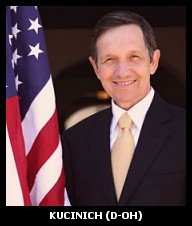 More of note, I suspect, at least in the years to come, is Ohio Democrat Rep. Dennis Kucinich's reasons for bucking his own party leadership to vote against the bill.
More of note, I suspect, at least in the years to come, is Ohio Democrat Rep. Dennis Kucinich's reasons for bucking his own party leadership to vote against the bill.
In a statement issued following passage of the bill (full statement posted below), the progressive Democrat describes it as "a bailout under a blue cross", given that it "would put the government in the role of accelerating the privatization of health care [by] requiring at least 21 million Americans to buy private health insurance from the very industry that causes costs to be so high, which will result in at least $70 billion in new annual revenue, much of which is coming from taxpayers."
He also notes that the "'robust public option' which would have offered a modicum of competition to a monopolistic industry was whittled down from an initial potential enrollment of 129 million Americans to 6 million."
Also, as Ernie Canning reported at The BRAD BLOG the week before last, the final house bill stripped Kucinich's amendment --- passed in committee by a 27 to 19 vote, including 13 Republicans --- which would have allowed states to create their own single-payer health care plan if they had wished. There was nary a peep about dropping that important attempt at state's rights from any of the Republicans as far as I know, and Kucinich says it was done "at the request of the Administration."
With all of the Tea Baggery and other idiotic, misinformed complaints about this bill, legitimate criticism of it that Republicans might have actually found common ground with Democrats on --- and, in the bargain, brought some actual conservative ideals to the bill, had actual conservatism played any role in their many pitiable months spent on street theater and sore-losery --- was all but thrown out the window vis a vis pathetic Fox "News"-fueled party politicking.
"This health care bill continues the redistribution of wealth to Wall Street at the expense of America's manufacturing and service economies which suffer from costs other countries do not have to bear," Kucinich notes in his statement, "especially the cost of health care. America continues to stand out among all industrialized nations for its privatized health care system. As a result, we are less competitive in steel, automotive, aerospace and shipping while other countries subsidize their exports in these areas through socializing the cost of health care."
One almost entirely overlooked and completely misunderstood point amidst all the sturm und drang over the mandate for citizens to purchase health insurance, as included in both the House and Senate versions of the bill, is that it's impossible to do away with private healthcare companies' "pre-existing conditions" rules unless everyone buy into the system. If not, only those who actually need health care would bother to buy insurance. If "pre-existing conditions" cannot be used to keep you out of a private healthcare plan, then why would one waste money on insurance until the point that one actually needed medical care?
Thus, the mandate requiring all to buy insurance. Otherwise, only the sick would have insurance in large part, and there would be no way to afford it.
That is, of course, only the case when there is no single-payer plan, such as the one Kucinich and other Progressive Democrats have been fighting for for months, only to be completely shut out of the debate by both House and Senate leaders, as well as the White House.
Nonetheless, while that fight is largely lost for now, it will, almost assuredly, return in the future, as the failings of the private health insurance industry become more and more obvious and more and more costly on virtually every front.
"Notwithstanding the fate of H.R. 3962, America will someday come to recognize the broad social and economic benefits of a not-for-profit, single-payer health care system, which is good for the American people and good for America's businesses, with of course the notable exceptions being insurance and pharmaceuticals," Kucinich avers in conclusion before linking folks again to his petition calling for the recognition of health care as a basic civil right in support of the House Progressive Caucus' ignored-H.R. 676 "Medicare for All Act", which is universal, single-payer health care legislation.
That petition notes several important points which may be appreciated either now or later, but at some point will all be understood by all but the most helplessly dis-informed Americans. Therefore, we include them here, along with Kucinich's statement today in full below them, largely for the historic record which, as noted, we'll no doubt be returning to at some point in the future...
Whereas today, nearly 100 years later, 47 million Americans are uninsured and another 50 million are underinsured bringing great social and economic harm to the American family; and
Whereas, HR 676, authored by Congressmen John Conyers and Dennis Kucinich provides for Medicare for All, a universal, single payer, not-for-profit health care system which means the end of premiums, copays and deductibles; and
Whereas we are already paying for a universal standard of care but are not getting it because one of every three dollars in the health care system goes to the activities of the for-profit insurance system; and
Whereas HR676 firmly establishes health care as a Civil Right, consistent with the Preamble to the Constitution of the United States and Article 1, Section 8 of the U.S. Constitution which defines a purpose of government "to promote the General Welfare,"
You may sign that petition expressing your "STRONG SUPPORT FOR HR676, SINGLE PAYER HEALTH CARE, AND THE PRINCIPLES OF ECONOMIC JUSTICE FOR WHICH IT STANDS", right here.
Kucinich's full statement, explaining his vote last night against the Democratic House Health Care Insurance bill follows below...

Congressman Kucinich addresses vote on H.R. 3962
(November 7, 2009)
Congressman Dennis Kucinich after voting against H.R. 3962 addresses why he voted NO, stating:
"We have been led to believe that we must make our health care choices only within the current structure of a predatory, for-profit insurance system which makes money not providing health care. We cannot fault the insurance companies for being what they are. But we can fault legislation in which the government incentivizes the perpetuation, indeed the strengthening, of the for-profit health insurance industry, the very source of the problem. When health insurance companies deny care or raise premiums, co-pays and deductibles they are simply trying to make a profit. That is our system."
"Clearly, the insurance companies are the problem, not the solution. They are driving up the cost of health care. Because their massive bureaucracy avoids paying bills so effectively, they force hospitals and doctors to hire their own bureaucracy to fight the insurance companies to avoid getting stuck with an unfair share of the bills. The result is that since 1970, the number of physicians has increased by less than 200% while the number of administrators has increased by 3000%. It is no wonder that 31 cents of every health care dollar goes to administrative costs, not toward providing care. Even those with insurance are at risk. The single biggest cause of bankruptcies in the U.S. is health insurance policies that do not cover you when you get sick."
"But instead of working toward the elimination of for-profit insurance, H.R. 3962 would put the government in the role of accelerating the privatization of health care. In H.R. 3962, the government is requiring at least 21 million Americans to buy private health insurance from the very industry that causes costs to be so high, which will result in at least $70 billion in new annual revenue, much of which is coming from taxpayers. This inevitably will lead to even more costs, more subsidies, and higher profits for insurance companies - a bailout under a blue cross."
"By incurring only a new requirement to cover pre-existing conditions, a weakened public option, and a few other important but limited concessions, the health insurance companies are getting quite a deal. The Center for American Progress' blog, Think Progress, states, 'since the President signaled that he is backing away from the public option, health insurance stocks have been on the rise.' Similarly, healthcare stocks rallied when Senator Max Baucus introduced a bill without a public option. Bloomberg reports that Curtis Lane, a prominent health industry investor, predicted a few weeks ago that 'money will start flowing in again' to health insurance stocks after passage of the legislation. Investors.com last month reported that pharmacy benefit managers share prices are hitting all-time highs, with the only industry worry that the Administration would reverse its decision not to negotiate Medicare Part D drug prices, leaving in place a Bush Administration policy."
"During the debate, when the interests of insurance companies would have been effectively challenged, that challenge was turned back. The 'robust public option' which would have offered a modicum of competition to a monopolistic industry was whittled down from an initial potential enrollment of 129 million Americans to 6 million. An amendment which would have protected the rights of states to pursue single-payer health care was stripped from the bill at the request of the Administration. Looking ahead, we cringe at the prospect of even greater favors for insurance companies."
"Recent rises in unemployment indicate a widening separation between the finance economy and the real economy. The finance economy considers the health of Wall Street, rising corporate profits, and banks' hoarding of cash, much of it from taxpayers, as sign of an economic recovery. However in the real economy - in which most Americans live - the recession is not over. Rising unemployment, business failures, bankruptcies and foreclosures are still hammering Main Street."
"This health care bill continues the redistribution of wealth to Wall Street at the expense of America's manufacturing and service economies which suffer from costs other countries do not have to bear, especially the cost of health care. America continues to stand out among all industrialized nations for its privatized health care system. As a result, we are less competitive in steel, automotive, aerospace and shipping while other countries subsidize their exports in these areas through socializing the cost of health care."
"Notwithstanding the fate of H.R. 3962, America will someday come to recognize the broad social and economic benefits of a not-for-profit, single-payer health care system, which is good for the American people and good for America's businesses, with of course the notable exceptions being insurance and pharmaceuticals."


 'Green News Report' 1/15/26
'Green News Report' 1/15/26
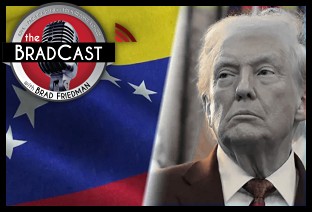 'This Isn't Close to Over': Mad King Trump in Venezuela (and Beyond): 'BradCast' 1/14/26
'This Isn't Close to Over': Mad King Trump in Venezuela (and Beyond): 'BradCast' 1/14/26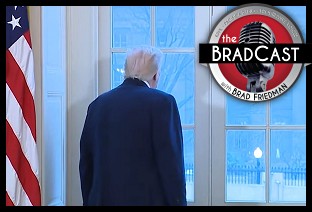 Things Getting Weirder
Things Getting Weirder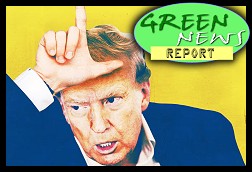 'Green News Report' 1/13/26
'Green News Report' 1/13/26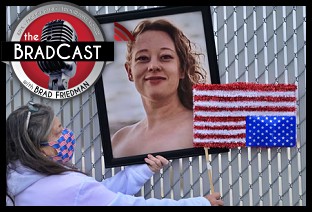 After ICE Murder in MN, Local Cops Disowning Fed Policing Practices: 'BradCast' 1/12/26
After ICE Murder in MN, Local Cops Disowning Fed Policing Practices: 'BradCast' 1/12/26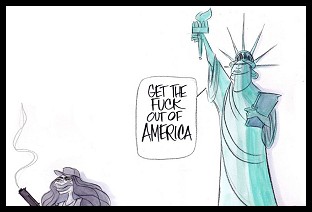 Sunday 'Ice Age' Toons
Sunday 'Ice Age' Toons Trump to Congress, Climate, U.N., Rule of Law, World: DROP DEAD - 'BradCast' 1/8/26
Trump to Congress, Climate, U.N., Rule of Law, World: DROP DEAD - 'BradCast' 1/8/26 'Green News Report' 1/8/26
'Green News Report' 1/8/26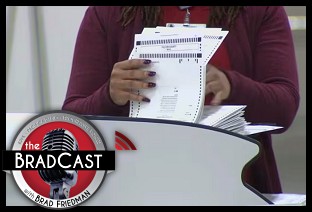 'Nonsense': Trumpers Claim 315k Fraudulent GA Votes in 2020: 'BradCast' 1/7/26
'Nonsense': Trumpers Claim 315k Fraudulent GA Votes in 2020: 'BradCast' 1/7/26 Jack Smith Testimony on Trump J6 Crimes, DOJ Weaponization: 'BradCast' 1/6/26
Jack Smith Testimony on Trump J6 Crimes, DOJ Weaponization: 'BradCast' 1/6/26 'Green News Report' 1/6/26
'Green News Report' 1/6/26 Trump's War on Venezuela is About Ego, Power, Creation of 'Alien Enemies': 'BradCast' 1/5/26
Trump's War on Venezuela is About Ego, Power, Creation of 'Alien Enemies': 'BradCast' 1/5/26 Sunday 'Peace President' Toons
Sunday 'Peace President' Toons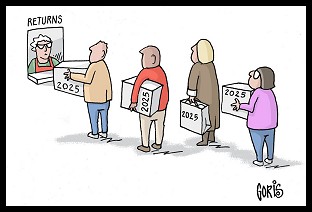 Sunday 'Many Happy Returns' Toons
Sunday 'Many Happy Returns' Toons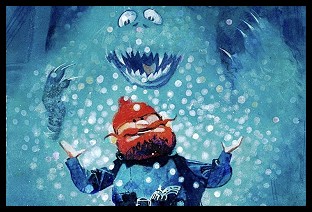 Have a Holly Jolly Somehow
Have a Holly Jolly Somehow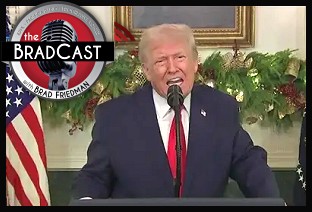 Old Man Shouts at People from WH for 20 Minutes: 'BradCast' 12/18/25
Old Man Shouts at People from WH for 20 Minutes: 'BradCast' 12/18/25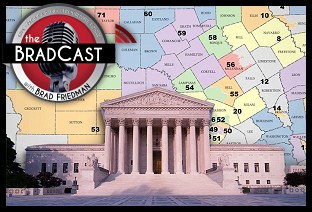 SCOTUS' How-To on Gerrymandering on 'Eve' of Election Year: BradCast' 12/17/25
SCOTUS' How-To on Gerrymandering on 'Eve' of Election Year: BradCast' 12/17/25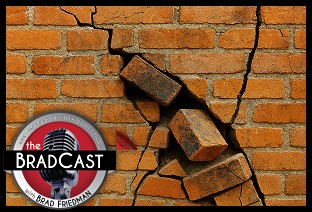 Bricks in the Wall: 'BradCast' 12/16/25
Bricks in the Wall: 'BradCast' 12/16/25 'This One Goes to 11': Weekend of Violence, Murder of Rob Reiner: 'BradCast' 12/15
'This One Goes to 11': Weekend of Violence, Murder of Rob Reiner: 'BradCast' 12/15 Trump Now Losing One Battle After Another: 'BradCast' 12/11/25
Trump Now Losing One Battle After Another: 'BradCast' 12/11/25 Dems Continue Stunning 2025 Election Streak: 'BradCast' 12/10/25
Dems Continue Stunning 2025 Election Streak: 'BradCast' 12/10/25 Petrostates and Propa-gandists Undermining Climate Science: 'BradCast' 12/9/25
Petrostates and Propa-gandists Undermining Climate Science: 'BradCast' 12/9/25
 VA GOP VOTER REG FRAUDSTER OFF HOOK
VA GOP VOTER REG FRAUDSTER OFF HOOK Criminal GOP Voter Registration Fraud Probe Expanding in VA
Criminal GOP Voter Registration Fraud Probe Expanding in VA DOJ PROBE SOUGHT AFTER VA ARREST
DOJ PROBE SOUGHT AFTER VA ARREST Arrest in VA: GOP Voter Reg Scandal Widens
Arrest in VA: GOP Voter Reg Scandal Widens ALL TOGETHER: ROVE, SPROUL, KOCHS, RNC
ALL TOGETHER: ROVE, SPROUL, KOCHS, RNC LATimes: RNC's 'Fired' Sproul Working for Repubs in 'as Many as 30 States'
LATimes: RNC's 'Fired' Sproul Working for Repubs in 'as Many as 30 States' 'Fired' Sproul Group 'Cloned', Still Working for Republicans in At Least 10 States
'Fired' Sproul Group 'Cloned', Still Working for Republicans in At Least 10 States FINALLY: FOX ON GOP REG FRAUD SCANDAL
FINALLY: FOX ON GOP REG FRAUD SCANDAL COLORADO FOLLOWS FLORIDA WITH GOP CRIMINAL INVESTIGATION
COLORADO FOLLOWS FLORIDA WITH GOP CRIMINAL INVESTIGATION CRIMINAL PROBE LAUNCHED INTO GOP VOTER REGISTRATION FRAUD SCANDAL IN FL
CRIMINAL PROBE LAUNCHED INTO GOP VOTER REGISTRATION FRAUD SCANDAL IN FL Brad Breaks PA Photo ID & GOP Registration Fraud Scandal News on Hartmann TV
Brad Breaks PA Photo ID & GOP Registration Fraud Scandal News on Hartmann TV  CAUGHT ON TAPE: COORDINATED NATIONWIDE GOP VOTER REG SCAM
CAUGHT ON TAPE: COORDINATED NATIONWIDE GOP VOTER REG SCAM CRIMINAL ELECTION FRAUD COMPLAINT FILED AGAINST GOP 'FRAUD' FIRM
CRIMINAL ELECTION FRAUD COMPLAINT FILED AGAINST GOP 'FRAUD' FIRM RICK SCOTT GETS ROLLED IN GOP REGISTRATION FRAUD SCANDAL
RICK SCOTT GETS ROLLED IN GOP REGISTRATION FRAUD SCANDAL VIDEO: Brad Breaks GOP Reg Fraud Scandal on Hartmann TV
VIDEO: Brad Breaks GOP Reg Fraud Scandal on Hartmann TV RNC FIRES NATIONAL VOTER REGISTRATION FIRM FOR FRAUD
RNC FIRES NATIONAL VOTER REGISTRATION FIRM FOR FRAUD EXCLUSIVE: Intvw w/ FL Official Who First Discovered GOP Reg Fraud
EXCLUSIVE: Intvw w/ FL Official Who First Discovered GOP Reg Fraud GOP REGISTRATION FRAUD FOUND IN FL
GOP REGISTRATION FRAUD FOUND IN FL

































